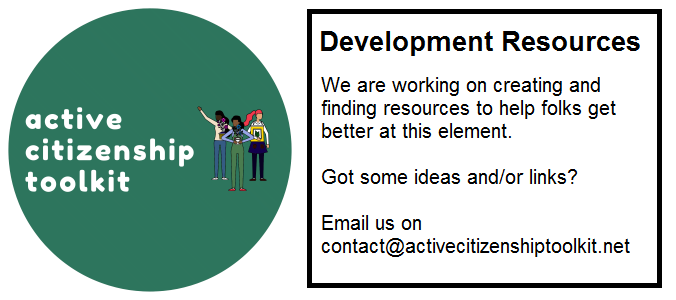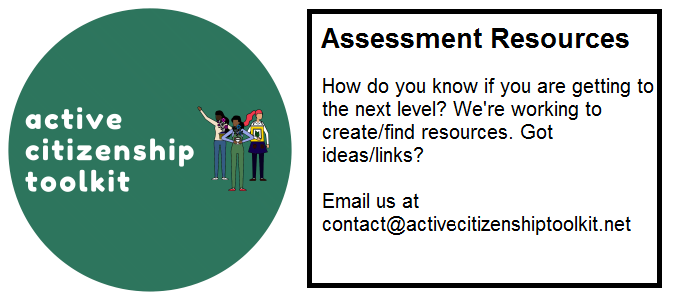Element Descriptor
Changes, eh? It turns out that these children that you spit on are not always quite aware what they’re going through. If you can articulate a theory of how things change, and what role your organisation and its allies might have, you’ll be in a better place to keep going, and gain other folks’ support. Without it – well, it’s like tactics without strategy, innit – the noise before defeat…Text
Level descriptors
| Novice | Practitioner | Expert | Ninja |
|---|---|---|---|
| You are aware of basic theories of how change happens or is prevented from happening in societies (especially yours). You have a working knowledge of homeostatic/homeodynamic mechanisms, you’ve heard of the ‘dialectical materialism’ thing, drift, Bill Moyer’s MAP etc. Ibn Khaldun. But you are hazy on which theory is most effective for you and your group(s). That’s okay, and probably worth holding onto as you “progress.” | You have a more complete and nuanced sense of past social movement-inspired “successes” and top down changes. You know your socio-technical transitions lingo (poor soul), and can talk about wars, pandemics, technology as possible drivers of change too. It’s all confusing, but you’re not confused. | You can read big fat books and dense academic articles for the lulz, spotting how they talk past each other and miss the various herds of elephants in the room. You can show how different lenses of ‘change’ will lead to different positions on the whole pessimism-optimism spectrum, and how the whole Heraclitus quote thing is probably the safest bet. You don’t get invited to many strategy away days though, because you make people nervous (insecure). Your Marxist chums/opponents deride you as a mystical bourgeois apologist running dog. | You can quote chunks of various religious, political, sociological tracts like Matt Damon in that scene in Good Will Hunting. You can compare and contrast the strengths , weaknesses (blind spots, technocratic, racist blindspots) of pretty much every theory of change under the sun. This makes you largely boring and useless to everyone, always. But that’s okay, because you’re a ninja now. Wow. |
Element Overview Essay
This is a draft. If something doesn’t make sense, or you see typos, or if you have further ideas, please email us on contact@activecitizenshiptoolkit.net
Well, I’ve got very little to say about this because I lost my theory of change down the side of the sofa somewhere, and for the life of me can’t find it.
What you’re looking at with a theory of change is exactly what it says on the tin. Now, the reason that social movement organisations tend to shy away from this is it’s really difficult and the big, previously popular theories of social change had come a bit unstuck.
So you know, it was going to be the urban proletariat the and the horny-handed sons of toil, led by their parties who were going to seize power and usher in the utopia. Didn’t turn out so well, that. Then it was going to be a third world peasants. Yeah. No, Then it was going to be the students. Yeah. No. Then it was going to be technology that was going to save us. Yeah. No. And there was also going to be the NGOs and various civil society outfits. Yeah, no.
And the problem is, nobody’s really, I think, got a sense of who is the “historical actor.” who is going to make this stuff, the stuff that we need to happen for the sake of our well, if not us, then “civilization” and our species and other species.
What’s that, who are the transformers? And yeah, no, it’s really difficult. So in the absence of a theory of change, people look away. But if you don’t have a theory of change, then you’re going to flail. So what to do? Discuss, which is what we’re doing in CEM, and keep convening.
But I don’t hold your breath for us to figure things out.
Development Resources

Assessment Resources

